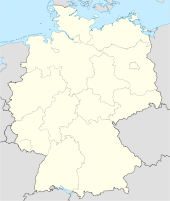- Bad Muskau
-
Mužakow
Bad MuskauMuskau Castle 
Coordinates 51°33′0″N 14°43′0″E / 51.55°N 14.716667°ECoordinates: 51°33′0″N 14°43′0″E / 51.55°N 14.716667°E Administration Country Germany State Saxony Admin. region Dresden District Görlitz Municipal assoc. Bad Muskau Town subdivisions 3 Mayor Andreas Bänder Basic statistics Area 15.35 km2 (5.93 sq mi) Elevation 110 m (361 ft) Population 3,828 (31 December 2010)[1] - Density 249 /km2 (646 /sq mi) Other information Time zone CET/CEST (UTC+1/+2) Licence plate GR Postal code 02953 Area code 035771 Website www.badmuskau.de Bad Muskau (German pronunciation: [ˌbaːt ˈmʊskaʊ]; formerly Muskau, Upper Sorbian: Mužakow, Polish: Mużaków) is a spa town in the historic Upper Lusatia region in Germany at the border with Poland. It is part of the Görlitz district in the State of Saxony.
It is located on the Lusatian Neisse, which since 1945 forms the German-Polish border, directly opposite the town of Łęknica (formerly Lugknitz). The municipality comprises the western half of the famous Muskau Park, a UNESCO World Heritage Site.
Contents
History
Muskau was founded in the 13th century and was first mentioned in 1249. The state country (Standesherrschaft) of Muskau was the largest of the Holy Roman Empire. It belonged to the Margraviate of Upper Lusatia, a Bohemian crown land which by the 1635 Peace of Prague passed to the Saxon Electorate, elevated to the Kingdom of Saxony in 1806. Much of Upper Lusatia was annexed by Prussia according to the 1815 Congress of Vienna and was administered within the Silesia Province.
Up to the beginning of the 19th century Muskau's direct rulers were the Counts of Callenberg, succeeded up to 1845 by Count (later Prince) Hermann von Pückler-Muskau, later on by Prince Wilhelm Friedrich Karl von Oranien-Nassau, and after him by the Counts von Arnim, right up to their flight in April 1945. After World War II it was divided along the Neisse River between East Germany and the Republic of Poland. About two thirds of the park came under Polish administration.
In 1962 Muskau was renamed "Bad Muskau" after a therapeutic bath (spa) was built there.
Twin towns
People
- Nathaniel Gottfried Leske (1751–1786), natural scientist
- Leopold Schefer (1784–1862), writer and composer
- Hermann von Pückler-Muskau (1785–1871), famous landscape gardener and writer, founder of the Park von Muskau
- Gustav Fechner (1801–1887), experimental psychologist
- Eduard Petzold (1815–1891), landscape gardener
References
- ^ "Bevölkerung des Freistaates Sachsen jeweils am Monatsende ausgewählter Berichtsmonate nach Gemeinden" (in German). Statistisches Landesamt des Freistaates Sachsen. 31 December 2010. http://www.statistik.sachsen.de/download/010_GB-Bev/Bev_Gemeinde.pdf.
External links
Bad Muskau · Beiersdorf · Bernstadt auf dem Eigen · Berthelsdorf · Bertsdorf-Hörnitz · Boxberg · Dürrhennersdorf · Ebersbach-Neugersdorf · Eibau · Gablenz · Görlitz · Groß Düben · Großschönau · Großschweidnitz · Hähnichen · Hainewalde · Herrnhut · Hohendubrau · Horka · Jonsdorf · Kodersdorf · Königshain · Krauschwitz · Kreba-Neudorf · Lawalde · Leutersdorf · Löbau · Markersdorf · Mittelherwigsdorf · Mücka · Neißeaue · Neusalza-Spremberg · Niedercunnersdorf · Niesky · Obercunnersdorf · Oderwitz · Olbersdorf · Oppach · Ostritz · Oybin · Quitzdorf am See · Reichenbach · Rietschen · Rosenbach · Rothenburg · Schleife · Schönau-Berzdorf · Schönbach · Schöpstal · Seifhennersdorf · Sohland am Rotstein · Trebendorf · Vierkirchen · Waldhufen · Weißkeißel · Weißwasser · Zittau
Categories:- Towns in Saxony
- Cities and towns in Görlitz District
- Germany–Poland border crossings
- Spa towns in Germany
Wikimedia Foundation. 2010.




